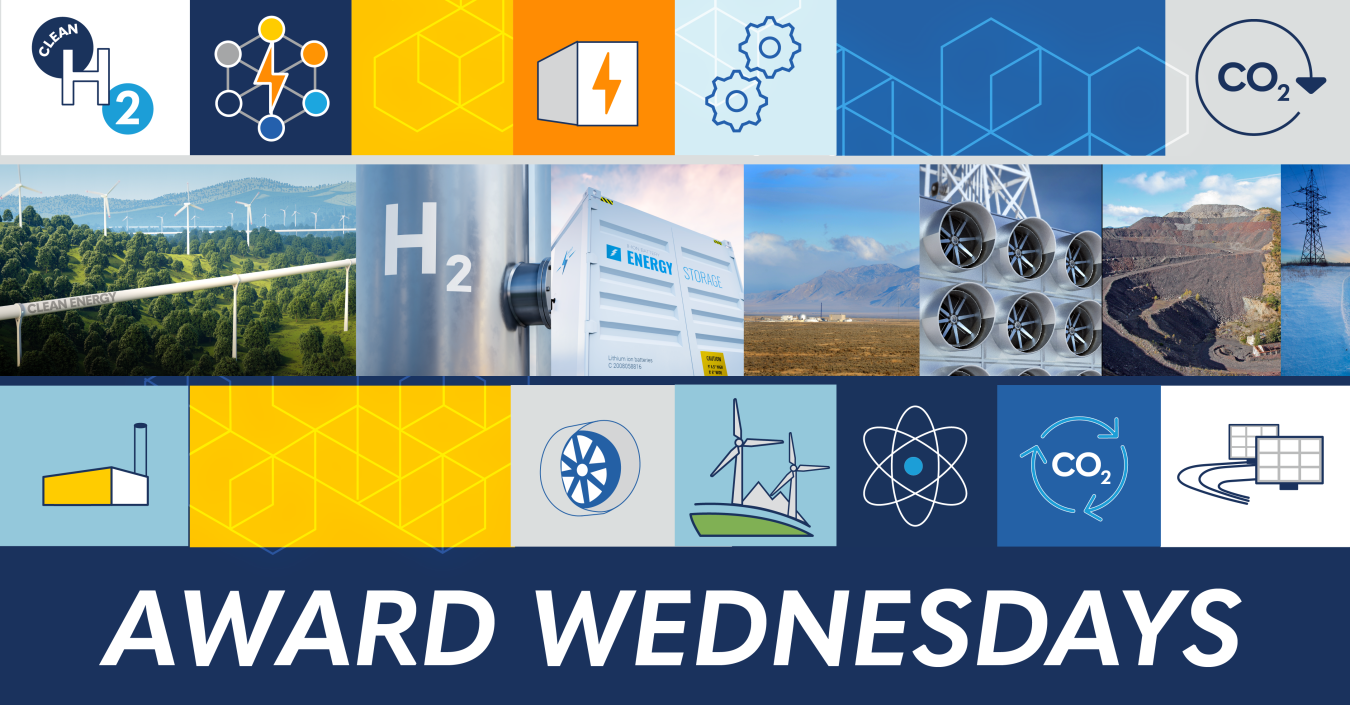This week's awards: ERA Phase 2 Prize Winners, ERA's Grid Access and Resiliency; IDP's Polyethylene Terephthalate Recycling Decarbonization , IDP's Iron Electric Induction Conversion; CC Pilots' Carbon Capture Pilot at Vicksburg Containerboard Mill
Office of Clean Energy Demonstrations
September 18, 2024
On Wednesdays, OCED will announce the latest projects that have successfully completed award negotiations. OCED will only issue an Award Wednesday notification on weeks when an award has been finalized.
AWARD ANNOUNCEMENTS
Energizing Rural Communities Prize Winners
33 Communities Awarded $200,000 for Second Phase of Energizing Rural Communities Prize
OCED announced 33 community winners for the second phase of the $15 million Energizing Rural Communities Prize. This prize challenges individuals and organizations in small, rural communities to develop partnership and financing strategies to improve energy systems and advance clean energy demonstration projects. Each winning team receives $200,000, in addition to the $100,000 and in-kind-mentorship services from the first phase of the prize. The Energizing Rural Communities Prize has two tracks: a partner track that is designed to create and strengthen partnerships for implementing energy projects; and a finance track to support new and innovative efforts to access capital or develop community ownership models for energy projects.
Learn more about the prize winners here.
Energy Improvements in Rural or Remote Areas
Grid Access and Resiliency for Unserved Rural and Indigenous People Project
OCED issued a grant award to the Grid Access and Resiliency for Unserved Rural and Indigenous People Project, led by Public Utility District #1 of Ferry County (PUD), committing up to $5 million in federal funding. This project aims to extend 30 miles of underground, electric distribution lines into a rural, unserved area in northeast Washington. PUD estimates that this project could extend grid access to approximately 135-190 full-time residential households that currently lack grid power and rely on diesel generators. To support this extension, the proposed project intends to upgrade the Strassburg Substation to increase its service capacity and resilience.
View the project fact sheet and community benefits commitments summary here. Learn more about engagement opportunities here.
Industrial Demonstrations Program
Polyethylene Terephthalate Recycling Decarbonization Project
OCED awarded the Polyethylene Terephthalate Recycling Decarbonization Project, led by Eastman Chemical Company, with more than $37 million (of the total project federal cost share of up to $375 million) to begin Phase 1 activities. Eastman Chemical Company plans to construct a first-of-its-kind plastic molecular recycling facility in Longview, TX capable of converting typically landfilled or incinerated waste into virgin-quality polyethylene terephthalate (PET) with high material to material yield. PET is a high-demand material used in packaging, film, and fiber applications. The facility plans to use thermal energy storage powered in part by renewable energy to decarbonize the process heating operations, resulting in a product with an estimated 70% lower carbon intensity than fossil virgin PET. During Phase 1 of the project, Eastman Chemical Company plans to perform engineering studies to support design development, provide documentation and reports necessary for OCED to complete the National Environmental Policy Act review, and continue discussions on labor and community benefits planning.
View the project fact sheet and community benefits commitments summary here. Learn more about engagement opportunities here.
Iron Electric Induction Conversion
OCED awarded the Iron Electric Induction Conversion project, led by United States Pipe and Foundry Company (U.S. Pipe), with more than $3.1 million (of the total project federal cost share of up to $75.5 million) to begin Phase 1 activities. U.S. Pipe plans to replace a coke-fired furnace with electric induction melting furnaces and substantially improve air quality for nearby communities by reducing pollution from particulate matter, nitrogen oxides, and sulfur oxides. This conversion aims to eliminate the need for natural gas and coke (derived from coal) in the iron melting process and result in an estimated reduction of more than 70% in the overall gate-to-gate carbon intensity associated with the production of Ductile Iron Pipe produced at the Alabama Works production facility. The project aims to improve air quality, reduce the cost of operations, improve manufacturing capacity, and enhance the overall melting process and reliability—demonstrating the viability of electrifying a core process for iron and steel manufacturing. During Phase 1 of the project, preliminary engineering design will be conducted along with the procurement of long lead time equipment.
View the project fact sheet and community benefits commitments summary here. Learn more about engagement opportunities here.
Carbon Capture Large-Scale Pilot Projects Program
Carbon Capture Pilot at Vicksburg Containerboard Mill
OCED awarded the Carbon Capture Pilot at Vicksburg Containerboard Mill project, led by RTI International in collaboration with International Paper (IP), SLB, and Amazon, with nearly $4.4 million (of the total federal cost share of up to $88 million) to begin Phase 1 activities. The project plans to build a carbon dioxide (CO2) capture system at IP’s Vicksburg Containerboard Mill—a pulp and paper mill in Redwood, MS. This first-of-its-kind carbon capture project for the pulp and paper industry aims to capture 120,000 metric tons of CO2 per year—equivalent to the annual emissions of more than 28,000 gasoline-powered cars—and transport it to a site for permanent geologic storage using existing pipelines. During Phase 1 of the project, RTI International plans to complete a FEED study to determine the specifications for incorporating carbon capture into the facility and will start workforce planning, project permitting, and providing input into OCED’s National Environmental Policy Act review process. Phase 1 also includes system component testing, business plans, establishment of emissions and effluent study protocol, community labor engagements, and community benefits planning.
View the project fact sheet and community benefits commitments summary here. Learn more about engagement opportunities here.





